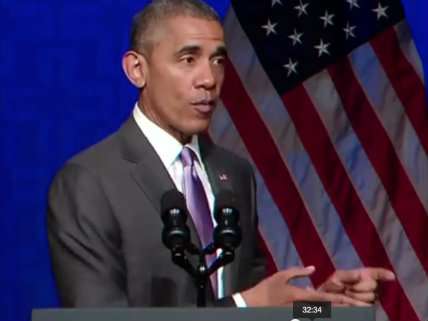Obamacare is Working Even Better Than President Obama Expected

Perhaps the strangest claim made by President Obama in his speech about health care earlier today is that, "in a lot of ways, the Affordable Care Act worked out better than some of us anticipated."
He followed up on this argument, which he's used version of before, by noting, as the White House has repeatedly bragged, that 16 million people have gained insurance under the law. Yet not all of the gains in health coverage are directly attributable to Obamacare, and, as Philip Klein of The Washington Examiner recently pointed out, enrollment in the law's exchanges has lagged for the two years they have been open. On this front, the law is clearly not performing up to the level that was anticipated.
In addition, Obama said, millions of already covered people have new protections under the law, and insurers cannot decline to sell coverage to Americans because they have preexisting health conditions. This is true enough, but it hardly represents a significant upside surprise. Obama seemed to be arguing that by meeting general expectations, the law had somehow performed better than he initially thought it would.
The larger point of Obama's speech, however, was not to catalog the law's results but to argue for its elevated position in American life. The law, he said is "a reality that people day to day on the ground are experiencing." Indeed, Obamacare has become more than just a binding statute. "Five years in, what we're talking about is no longer just a law," he said. The health law has "become part of the fabric of America."
As if to reiterate the point, the White House released a health care timeline as a supplement to the president's speech. The timeline traces major events in health policy and health politics back to 1912, when President Theodore Roosevelt campaigned on national health coverage. More than half of the events on the timeline occur after President Obama's election, and are related to the Affordable Care Act.
The president's lofty language, and the attempt to place the law in historical context, are presumably intended at least partly to suggest the settled permanence of the health law even as its implementation is up for review at the Supreme Court and much of the public, as well as one of the nation's two major political parties, remains opposed to it. Its permanence is in question, and so he insists that it is unquestionable.
But what it also reveals is how the president views his signature law, and how he understands its contribution to both history and his own legacy. Simply by existing, Obamacare has already achieved mythic status, at least in the eyes of President Obama. And in that sense, I suppose, it may well be exceeding his expectations.


Show Comments (96)